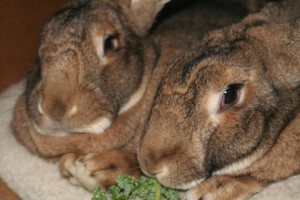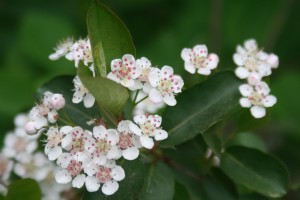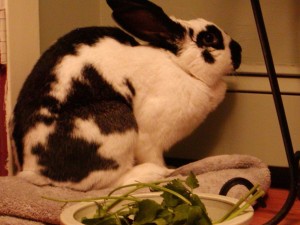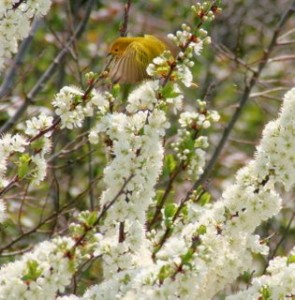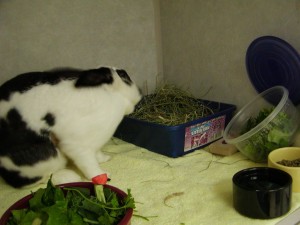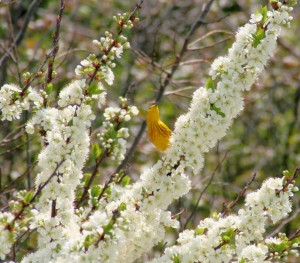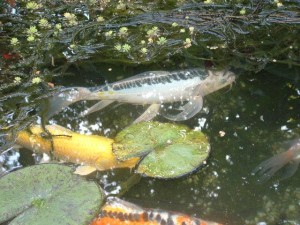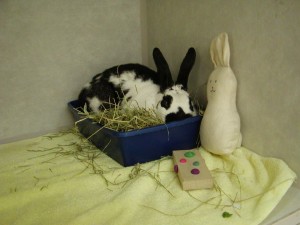 My ears are much better than my eyes at identifying birds. My distance vision is not good and I’m too vain to wear my eyeglasses other than when I’m driving. I find glasses especially uncomfortable with binoculars. Because I have trouble spotting the movement of birds, I’ve come to rely on my ears more than my eyes and have tried over the years to develop my knowledge of bird songs. It’s a handy skill to have (and a good way to impress non-birding friends) and is easy to do if you’re an auditory person like me. I’ve always learned best by listening and in school was often reprimanded for *daydreaming*, when in fact I was paying close attention with my ears rather than my eyes.
My ears are much better than my eyes at identifying birds. My distance vision is not good and I’m too vain to wear my eyeglasses other than when I’m driving. I find glasses especially uncomfortable with binoculars. Because I have trouble spotting the movement of birds, I’ve come to rely on my ears more than my eyes and have tried over the years to develop my knowledge of bird songs. It’s a handy skill to have (and a good way to impress non-birding friends) and is easy to do if you’re an auditory person like me. I’ve always learned best by listening and in school was often reprimanded for *daydreaming*, when in fact I was paying close attention with my ears rather than my eyes.
In the sprin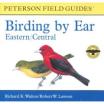 g I like to *warm-up* my ears to warbler song by listening to birdsong cd’s. This way I avoid the frustration of hearing birds that I can’t see while still knowing who’s out there singing. I like to play the cd’s at bedtime and usually fall asleep to their sweet seranade. I also make a *cheat sheet* that I carry with me when birding to help me distinguish between certain birds that I have trouble with. My favorites are the “Peterson’s Birding by Ear” and “Peterson’s More Birding by Ear”.
g I like to *warm-up* my ears to warbler song by listening to birdsong cd’s. This way I avoid the frustration of hearing birds that I can’t see while still knowing who’s out there singing. I like to play the cd’s at bedtime and usually fall asleep to their sweet seranade. I also make a *cheat sheet* that I carry with me when birding to help me distinguish between certain birds that I have trouble with. My favorites are the “Peterson’s Birding by Ear” and “Peterson’s More Birding by Ear”.
My friend Linda at work wants to learn about birds and I’ve offered to bring her along on a spring walk. She’s dissuaded by the early hour and suggests we have brunch, then bird, and finish up with some shopping. We have a running joke where she *sings* a bird song that she heard that morning to me and I’m supposed to tell her what it is that she heard. Somehow all of her *songs* sound the same. This morning she saw a cardinal and I tried to teach her its song as “Tear-tear-tear.” With her Brooklyn accent it turned into something unrecognizable, but we’ll keep working on it.
A LISTENER’S GUIDE TO THE BIRDS by E.B. White
Wouldst thou know the lark?
Then hark!
Each natural bird
Must be seen and heard.
The lark’s “Tee-ee” is a tinkling entreaty.
But it’s not always “Tee-ee” –
Sometimes it’s “Tee-titi.”
So watch yourself.
Birds have their love-and-mating song,
Their warning cry, their hating song;
Some have a night song, some a day song,
A lilt, a tilt, a come-what-may song;
Birds have their careless bough and teeter song
And, of course, their Roger Tory Peter song.
The studious ovenbird (pale pinkish legs)
Calls, “Teacher, teacher, teacher!”
The chestnut-sided warbler begs
To see Miss Beecher.
“I wish to see Miss Beecher.”
(Sometimes interpreted as “Please please please ta
meetcha.”)
The redwing (frequents swamps and marshes)
Gurgles, “Konk-la-ree,”
Eliciting from the wood duck
The exclamation “Jeeee!”
(But that’s the male wood duck, remember.
If it’s his wife you seek,
Wait till you hear a distressed “Whoo-eek!”)
Nothing is simpler than telling a barn owl from a veery:
One says, “Kschh!” in a voice that is eerie,
The other says, “Vee-ur” in a manner that is breezy.
(I told you it was easy.)
On the other hand, distinguishing between the veery
And the olive-backed thrush
Is another matter. It couldn’t be worse.
The thrush’s song is similar to the veery’s,
Only it’s in reverse.
Let us suppose you hear a bird say, “Fitz-bew,”
The things you can be sure of are two:
First, the bird is an alder flycatcher (Empidonax traillii
traillii);
Second, you are standing in Ohio – or as some people
call it, O-hee-o-
Because, although it may come as a surprise to you,
The alder flycatcher, in New York or New England,
does not say, “Fitz-bew,”
It says, “Wee-be-o.”
“Chu-chu-chu” is the note of the harrier,
Copied of course, from our common carrier.
The osprey, thanks to a lucky fluke,
Avoids “Chu-chu” and cries, “Chewk, chewk!”
So there’s no difficulty there.
The chickadee likes to pronounce his name;
It’s extremely helpful and adds to his fame.
But in spring you can get the heebie-jeebies
Untangling chickadees from phoebes.
The chickadee, when he’s all afire,
Whistles, “Fee-bee,” to express his desire.
He should be arrested and thrown in jail
For impersonating another male.
(There’s a way you can tell which bird is which,
But just the same, it’s a nasty switch.)
Our gay deceiver may fancy-free be
But he never does fool a female phoebe.
Oh, sweet the random sounds of birds!
The old-squaw, practising his thirds;
The distant bittern, driving stakes,
The lonely loon on haunted lakes;
The white-throat’s pure and tenuous thread-
They go to my heart, they go to my head.
How hard it is to find the words
With which to sing the praise of birds!
Yet birds, when they get singing praises,
Don’t lack for words – they know some daisies:
“Fitz-bew,”
“Konk-la-reeee,”
“Hip-three-cheers,”
“Onk-a-lik, ow-owdle-ow,”
“Cheedle, cheedle chew,”
And dozens of other inspired phrases.
Got that, Linda?

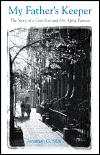 A dear childhood friend passed along a recommendation for this new book written by one of his colleagues at Bank Street College in Brooklyn. It sounds like a relevant read for anyone who is a caregiver or is concerned with the issues of aging parents. Another one to look for on my next stop at the bookstore.
A dear childhood friend passed along a recommendation for this new book written by one of his colleagues at Bank Street College in Brooklyn. It sounds like a relevant read for anyone who is a caregiver or is concerned with the issues of aging parents. Another one to look for on my next stop at the bookstore.